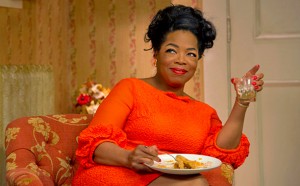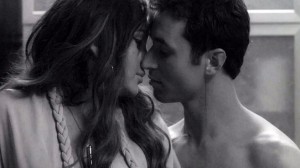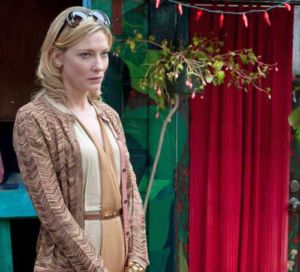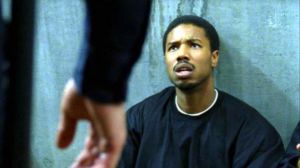Forest Whitaker Gump
 One of the problems with starting a movie with the words “Inspired by a true story” written on the screen is that most people will focus on “true story” and not on “inspired by.” That phrase opens Lee Daniels’ The Butler — which I will refer to as The Butler from now on both because the stupid copyright fight that forced Daniels’s name onto the film is stupid and also because the editor in me is appalled that they used Daniels’ and not Daniels’s – and it began to bother me about ten minutes into the film, when the first series of utterly absurd plot developments occurred: In 1926, on a cotton farm in Georgia, the boy who will become the butler for six presidents watches his mother (randomly Mariah Carey) dragged into a shed where she’s raped and then his father shot in the head for protesting. In some vague form of sympathy, but not guilt, the murderer’s grandmother (randomly Vanessa Redgrave) tells the boy to stop crying before informing him she’s going to teach him how to become a “house nigger.”
One of the problems with starting a movie with the words “Inspired by a true story” written on the screen is that most people will focus on “true story” and not on “inspired by.” That phrase opens Lee Daniels’ The Butler — which I will refer to as The Butler from now on both because the stupid copyright fight that forced Daniels’s name onto the film is stupid and also because the editor in me is appalled that they used Daniels’ and not Daniels’s – and it began to bother me about ten minutes into the film, when the first series of utterly absurd plot developments occurred: In 1926, on a cotton farm in Georgia, the boy who will become the butler for six presidents watches his mother (randomly Mariah Carey) dragged into a shed where she’s raped and then his father shot in the head for protesting. In some vague form of sympathy, but not guilt, the murderer’s grandmother (randomly Vanessa Redgrave) tells the boy to stop crying before informing him she’s going to teach him how to become a “house nigger.”
And I muttered in my seat, “Really? All in one hour?” Obviously, this could have happened; worse has and will happen. But it strained credibility for me. As it should have. Despite the word “true,” and the publicity story that the film is actually about the black butler who served six presidents from Eisenhower to Reagan, almost nothing in the film is true, except that a black butler served six presidents from Eisenhower to Reagan. The real man, Eugene Allen, must not have had as interesting a life as his work history might indicate, so Lee Daniels and his screenwriter Danny Strong have turned him in Cecil Gaines, who is basically the black Forrest Gump, witnessing just about every single event of the Civil Rights Movement. Unlike Forrest Gump, however, The Butler is not meant to be a fable, nor is it well directed and certainly not well written. The Butler is a nicely acted and enormously earnest movie about civil rights, honor, duty, and the value of hard work. It’s also obvious, bombastic, and, occasionally, unintentionally funny. Continue…



